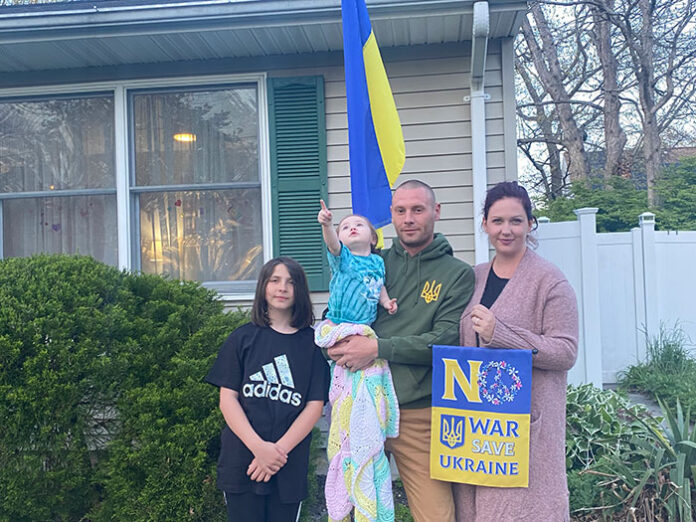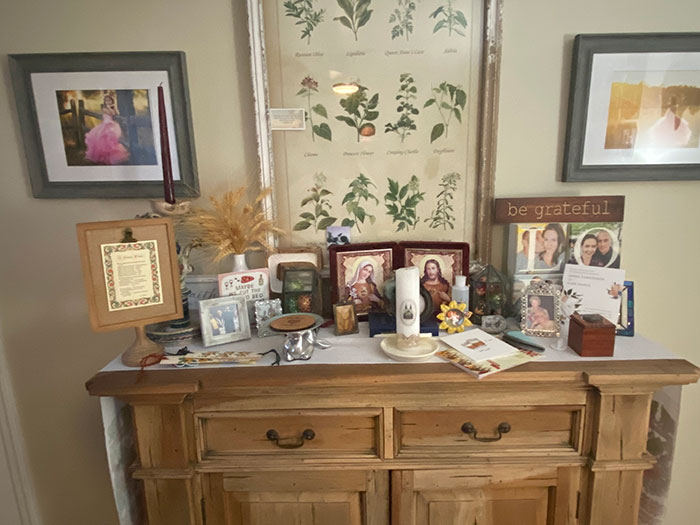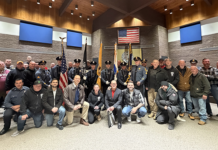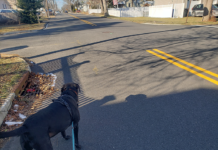
MANAHAWKIN – To play on a line from John Steinbeck’s “Of Mice and Men,” when the best-laid plans go awry, there’s often cause for concern.
Manahawkin residents Andrii and Mallory Shtibel know the feeling too well. They’ve put a hold on a long-awaited family trip this summer for reasons beyond their control.
The Shtibels planned to visit Andrii’s birthplace in Uzhhorod, Ukraine, to see his family back home. Instead, Russia’s invasion of Ukraine plays heavily on the young couple’s minds as they live through the terror from afar.
Andrii’s parents, Misha, 65, and Maryana, 56, reside in Uzhorod, with Andrii’s grandmother, aunt, and 21-year-old sister Natalya. The city is located in the western part of Ukraine, approximately 25 kilometers (15.5 miles) from the country’s border with Slovakia. Andrii said he could actually view the neighboring nation from the second floor of his family home.
Mallory, 33, speaks fondly of the in-laws she’s never met in person. She longs for the day they will exchange joyful hugs with the newest addition to their family, one-year-old Kendyl. Andrii, 35, also looks forward to introducing his nine-year-old stepdaughter Kennedy as part of the life he’s made in the United States.

“We were so excited to go this summer and had everything mapped out,” said Mallory. “I didn’t even breathe a word about us not going when the war started because my heart hurt for him (Andrii).”
In the beginning, Andrii seemed somewhat convinced things would end quickly, saying Putin appeared to limit his attempts at occupation to the eastern part of Ukraine. Andrii felt somewhat reassured because his family lived in the west.
“They didn’t start to get concerned until the air raid sirens began happening to them,” Mallory shared. “It was three weeks after the war actually started.”
Technology brought the sounds closer to home. Andrii downloaded an app on his phone made available by the Ukrainian government after the Russians first started to bomb. Residents enter their location and wait for a voice to tell them that all is safe after the sirens go off.
While Mallory doesn’t understand the words spoken softly in Ukrainian, she found the alarm announcing it frightening. Maryana also expressed her dismay that her son worried so much from a place so far away.
“I took it (the app) off my phone because I told my mom I would delete it,” said Andrii. “I don’t want her overstressed.”
Meanwhile, the attacks have not been confined to just the eastern part of the country. A couple of weeks ago, missiles hit Volóc, a town less than two hours from Uzhhorod. Wartime remains unpredictable.
Andrii submits that most Ukrainians were not surprised when Russia decided to invade their homeland months ago. Sanctions imposed by the United States and the European Union seemed to matter little when it came to the quest for more territory.

“Some people think the war just started now,” said Andrii. “But it really began in 2014 when the East of Ukraine tried to figure things out based on the Minsk agreements with Russia as far as territory.”
Andrii shuddered slightly as he compared how Russia’s army acted in Syria to the attack on Ukraine. In both cases, the travesty against civilians represented humanity at its worst. Andrii senses that other countries like Poland may worry that tomorrow Putin could come for them.
When the war initially broke out, Andrii considered returning to the home of his birth. In the United States since 2015, he served in the Ukrainian military for one year prior to coming here. Andrii has a degree in tourism but worked as a professional firefighter for his local community.
Mallory, who married Andrii in 2020, implored her husband to stay home. She reminded him of the family they started together and suggested they could offer help in other ways.
The couple has kept true to their pledge by sending assistance with money raised by other locals. Andrii spoke with his family to see what was needed to assist people back home.
“We aren’t buying things to send to the military on the front lines,” Andrii said. “When we connected with some of the soldiers, we found out that one of the biggest problems was they had problems with seeing things at night.”
That’s where Andrii’s firefighter training came in handy. He arranged to send thermal imaging cameras back home. The equipment is typically used by firefighters to see through smoke and determine people’s locations.
In the meantime, one more member of Andrii’s immediate family remains overseas. His brother, Marian, is 30 and works in Slovakia. A week after the conflict started, Marian wanted to return to Ukraine to defend the country.

“I told him that I didn’t think he should go because he didn’t have any military experience,” said Andrii. “He works for a factory, and his boss said that in case something should go wrong, his family in Ukraine could shelter there. So I told him he could help from there.”
Both Mallory and Andrii hoped to bring Natalya to the United States and had even begun preparations for a room for her. However, the red tape involved makes the timeline difficult to determine. In the first place, Natalya would need to travel eight hours to acquire the necessary documentation and could still be denied.
“The region has no military actions right now,” Andrii explained. “There are no bombs and shelling that would make it a reason to come here.”
Natalya, a talented artist, has taken on different work at home. Andrii estimates that Uzhhorod has over 100,000 refugees from the east. His family has collectively been hosting people who are without homes of their own.
During peacetime, Uzhhorod is a flourishing city of approximately 150,000 people, which Andrii described as multi-cultured. He attributed the differences as part of its previous associations with Czechoslovakia and Hungary.
“You can walk from one side of the city to the other side in less than two hours,” said Andrii. “It was a popular tourist destination and known for its cherry blossoms.”
Mallory said she’s visited the city through online videos and looks forward to visiting in-person. She also performs a nightly ritual for those suffering through the war.
“I have a God box and a candle that was sent from our family in Ukraine before we were married,” Mallory said. “It was lit the day we were married. It was lit on our anniversary and on special occasions. I lit it every night since the war started.”
Andrii said he could wait to return to his homeland if only he had one assurance.
“Just promise me that no one else will die in Ukraine from today,” said Andrii. “No Ukrainians, no babies – that no will else will die and that this war will stop. I’m ready to wait to see my family if this could happen.”
A promise – that already remains broken as more and more people lose their lives to the travesty of war.






